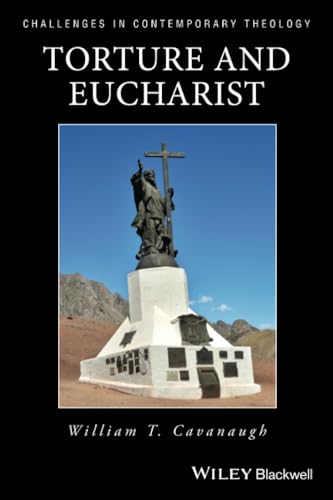Torture and Eucharist
Theology, Politics, and the Body of Christ
William T. Cavanaugh
BOOK REVIEW

The weight of suffering, particularly in the context of faith, resonates deeply within Torture and Eucharist: Theology, Politics, and the Body of Christ, a groundbreaking work by William T. Cavanaugh. This book challenges readers to confront the brutal realities of bodily suffering and the sacramental power of the Eucharist in an age often dominated by political strife and spiritual disillusionment. Cavanaugh brilliantly intertwines the grotesque imagery of torture with the profound mysteries of the Christian faith, provoking a visceral reaction that reverberates far beyond its pages.
In an era when the clash between religious conviction and political machination seems more pronounced than ever, Cavanaugh's assertions cut through the noise. He transports us into the dark alleys of history-torture as a tool employed by those in power, a method that strips away the dignity and sanctity of the body, only to contrast this with the rich theological implications of the Eucharist. In doing so, he begs the question: what does it mean for a body to be the vessel of Christ? How does the ritual of communion, a profound representation of suffering and resurrection, serve as a counter-narrative to the pervasive violence of our world?
Cavanaugh's exploration is not merely an academic exercise; it is a theological awakening that grips you, stitching together the threads of redemption and despair. Torture and Eucharist dives into the deep end of existential reflection, where pain becomes a profound teacher. His thesis suggests that our understanding of the Eucharist is irrevocably tied to the realities of oppression and suffering-where love is manifested not in escapism, but in a heart-wrenching engagement with the world's horrors.
Readers across the spectrum have responded to Cavanaugh's work with a mix of admiration and discomfort. Critics often find the juxtaposition of such stark themes provocative. Some argue that he risks trivializing the sacred by linking it so intimately with the profane. However, others commend his audacity to tackle these subjects head-on, insisting that it is precisely this confrontation with discomfort that facilitates spiritual growth.
Cavanaugh challenges the complacency of a world steeped in indifference. When he writes about the torture recounted in history-from the Inquisition to contemporary human rights abuses-he does not invite you to look away. Instead, he insists that you confront these realities and allow them to shape your understanding of faith. In a startling passage, he asserts that the Eucharist becomes a form of resistance against the systemic torture, urging believers to reclaim the body as sacred amidst the chaos.
Consider the contemporary relevance of this work. The echoes of torture and suffering resound in the ongoing global crises, from oppressive regimes to widespread human rights violations. If the Eucharist symbolizes a communal gathering of the broken, then Cavanaugh's work emerges as essential reading for anyone grappling with their place within this fractured world. Is it enough to simply partake in the ritual of communion without acknowledging the pain that surrounds us, without seeking to address the injustices that tear at the fabric of humanity?
The emotional weight of the text is palpable, and readers often report a profound transformation in their understanding of both the church and societal obligation. As you traverse the labyrinth of Cavanaugh's arguments, prepare for an emotional upheaval that could very well lead to a reevaluation of individual faith practices. The outrage elicited by these historical atrocities, confronted through the lens of Eucharistic theology, is both liberating and troubling.
If you find yourself feeling the tug of indignation rising within you as you read, know that Cavanaugh beckons you to take a stand. The book implores you to embody the radical implications of the Eucharist-not merely as a ritual, but as a commitment to justice, mercy, and the very essence of Christ's radical love. The consequences of ignoring this call are dire; as Cavanaugh artfully indicates, an unexamined faith can lead to complicity in the face of suffering.
You may find yourself contemplating the role of communities in this journey-a journey that inevitably leads to the question: What does it mean to be the Body of Christ in a world rife with torture and indignity? Would you turn a blind eye, or dare to engage?
In the end, Torture and Eucharist is not just an academic discourse; it's an emotional provocation that urges you to confront the deepest facets of your beliefs. It's time to immerse yourself in this formidable exploration and allow its impactful revelations to ignite your spirit. Understanding the severe intertwining of the sacred and the profane through Cavanaugh's lens may just be the key to unlocking a more profound, more compassionate existence in today's tumultuous world. 🌍💔
📖 Torture and Eucharist: Theology, Politics, and the Body of Christ
✍ by William T. Cavanaugh
🧾 286 pages
1998
#torture #eucharist #theology #politics #body #christ #william #cavanaugh #WilliamTCavanaugh